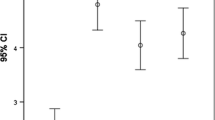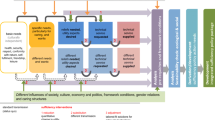Abstract
Heating and warm water consumption are frequently billed based on actual consumption, and this approach can be assumed to provide a financial incentive to energy consumers to opt for energy-conserving behaviour (e.g., reducing the room temperature or using warm water economically). In many multi-flat buildings in Switzerland, tenants and homeowners still receive a heating and warm water bill that is based on a flat rate that depends on the size of the dwelling, rather than a bill that is based on the amount of energy actually consumed. In such a situation, there may be a social dilemma that leads to non-cooperative behaviour; economic theory predicts that households would choose a strategy of not sacrificing their level of comfort and, therefore, would not opt for energy-conserving behaviour. Psychological theory, on the other hand, suggests that a change in billing type might not, in and of itself, be a sufficient motivator to promote energy-conserving behaviour. This study aims to gain insight into Swiss consumers’ underlying motivations in conserving energy. It empirically tests whether and how a difference in billing type affects consumers’ current stated energy behaviour and their stated intention to conserve energy in the future. In neither of two separate studies was there any evidence of such a possible unscrupulous energy user’s dilemma. Thus, on its own, consumption-based billing might not lead to significant changes in consumer behaviour. However, it could constitute an essential part of a wider behaviour modification programme that includes more effective billing and direct feedback programmes.
Similar content being viewed by others
References
Abrahamse, W., & Steg, L. (2011). Factors related to household energy use and intention to reduce it: the role of psychological and socio-demographic variables. Human Ecology Review, 18, 30–40.
Allison, S. T., & Messick, D. M. (1990). Social decision heuristics in the use of shared resources. Journal of Behavioral Decision Making, 3, 195–204.
Aravena, C., Riquelme, A., & Denny, E. (2016). Money, comfort or environment? Priorities and determinants of energy efficiency investments in Irish households. Journal of Consumer Policy, 1–28.
Asensio, O. I., & Delmas, M. A. (2015). Nonprice incentives and energy conservation. Proceedings of the National Academy of Sciences, 112(6), 510–515.
Attari, S. Z., DeKay, M. L., Davidson, C. I., & De Bruin, W. B. (2010). Public perceptions of energy consumption and savings. Proceedings of the National Academy of Sciences, 107(37), 16054–16059.
Bamberg, S., Hunecke, M., & Blöbaum, A. (2007). Social context, personal norms and the use of public transportation: two field studies. Journal of Environmental Psychology, 27, 190–203.
Beunder, A., & Groot, L. (2015). Energy consumption, cultural background and payment structure. Journal of Cleaner Production, 94, 137–143.
Bolderdijk, J. W., Steg, L., Lehman, P., Geller, S., & Postmes, T. (2012). Comparing the effectiveness of monetary versus moral motives in environmental campaigning. Nature Climate Change, 3, 413–416.
Burger, P., Bezençon, V., Bornemann, B., Brosch, T., Carabias-Hütter, V., Farsi, M., et al. (2015). Advances in understanding energy consumption behavior and the governance of its change—outline of an integrated framework. Frontiers in Energy Research, 3, 1–19.
Canton of St. Gallen (2015). Verbrauchsabhängige Heizkostenabrechnung (VHKA). Retrieved from: http://www.umwelt.sg.ch/home/Themen/Energie/VHM_Energie/bauten___anlagen/begriff___anforderungen/heizkostenabrechnung.html.
International Panel on Climate Change (2007). Human and natural drivers of climate change. Retrieved from: https://www.ipcc.ch/publications_and_data/ar4/wg1/en/spmsspm-human-and.html.
International Panel on Climate Change (2014). Climate change 2014 synthesis report—summary for policymakers. Retrieved from: https://www.ipcc.ch/pdf/assessment-report/ar5/syr/AR5_SYR_FINAL_SPM.pdf.
Cuthbert, R. (1994). Variable disposal fee impact. BioCycle, 35, 63–65.
Dahlén, L., & Lagerkvist, A. (2010). Pay as you throw: strengths and weaknesses of weight-based billing in household waste collection systems in Sweden. Waste Management, 30, 23–31.
De Groot, J. I., Abrahamse, W., & Jones, K. (2013). Persuasive normative messages: the influence of injunctive and personal norms on using free plastic bags. Sustainability, 5, 1829–1844.
DellaVigna, S., & Malmendier, U. (2006). Paying not to go to the gym. The American Economic Review, 96, 694–719.
Delmas, M. A., Fischlein, M., & Asensio, O. I. (2013). Information strategies and energy conservation behavior: a meta-analysis of experimental studies from 1975 to 2012. Energy Policy, 61, 729–739.
Diekmann, A., & Preisendörfer, P. (1991). Umweltbewusstsein oder Anreizstrukturen? Die Grenzen der Verhaltenswirksamkeit des Umweltbewusstseins. In W. Joussen & A. G. Hessler (Eds.), Umwelt und Gesellschaft (pp. 105–127). Berlin: Akademie Verlag.
Diekmann, A., & Preisendörfer, P. (1998). Environmental behavior discrepancies between aspirations and reality. Rationality and Society, 10, 79–102.
Dogan, E., Bolderdijk, J. W., & Steg, L. (2014). Making small numbers count: environmental and financial feedback in promoting eco-driving behaviours. Journal of Consumer Policy, 37, 413–422.
Dolan, P., & Metcalfe, R. (2013). Neighbors, knowledge, and nuggets: two natural field experiments on the role of incentives on energy conservation. London: Centre for Economic Performance.
Doran, R., & Larsen, S. (2016). The relative importance of social and personal norms in explaining intentions to choose eco-friendly travel options. International Journal of Tourism Research, 18, 159–166.
Fleishman, J. A. (1980). Collective actions as helping behaviour: effect of responsibility diffusion on contributions to a public good. Journal of Personality and Social Psychology, 38, 629–637.
Gatersleben, B. (2001). Sustainable household consumption and quality of life: the acceptability of sustainable consumption patterns and consumer policy strategies. International Journal of Environment and Pollution, 15, 200–216.
German Federal Government (2012). Richtig heizen – und Geld sparen. Retrieved from: https://www.bundesregierung.de/Content/DE/Publikation/Bestellservice/2012-10-23-faltblatt-richtig-heizen-und-geld-sparen.pdf;jsessionid=31E9D5B69E38B1D24DC1EA069AF921B4.s2t2?__blob=publicationFile&v=9.
Gillingham, K., Harding, M., & Rapson, D. (2012). Split incentives and household energy consumption. Energy Journal, 33, 37–62.
Glance, N. S., & Huberman, B. A. (1994). The dynamics of social dilemmas. Scientific American, 270, 76–81.
Hackett, B., & Lutzenhiser, L. (1991). Social structures and economic conduct: interpreting variations in household energy consumption. Sociological Forum, 6, 449–470.
Herweg, F., & Mierendorff, K. (2013). Uncertain demand, consumer loss aversion, and flat-rate tariffs. Journal of the European Economic Association, 11, 399–432.
Heyman, J., & Ariely, D. (2004). Effort for payment a tale of two markets. Psychological Science, 15, 787–793.
Ito, K. (2014). Do consumers respond to marginal or average price? Evidence from nonlinear electricity pricing. American Economic Review, 104, 537–563.
Joskow, P. L., & Wolfram, C. D. (2012). Dynamic pricing of electricity. The American Economic Review, 102, 381–385.
Kaiser, F. G., Hubner, G., & Bogner, F. X. (2005). Contrasting the theory of planned behavior with the value-belief-norm model in explaining conservation behavior. Journal of Applied Social Psychology, 35, 2150–2170.
Kuhlman, D. M., & Marshello, A. F. (1975). Individual differences in game motivation as moderators or preprogrammed strategy effects in prison’s dilemma. Journal of Personality and Social Psychology, 32, 922–931.
Lambrecht, A., & Skiera, B. (2006). Paying too much and being happy about it: existence, causes, and consequences of tariff-choice biases. Journal of Marketing Research, 43, 212–223.
Levinson, A., & Niemann, S. (2004). Energy use by apartment tenants when landlords pay for utilities. Resource and Energy Economics, 26, 51–75.
Lindén, A. L., Carlsson-Kanyama, A., & Eriksson, B. (2006). Efficient and inefficient aspects of residential energy behaviour: what are the policy instruments for change? Energy Policy, 34, 1918–1927.
Lindsay, J. J., & Strathman, A. (1997). Predictors of recycling behavior: an application of a modified health belief model. Journal of Applied Social Psychology, 27, 1799–1823.
Lutzenhiser, L. (1992). A cultural model of household energy consumption. Energy, 17, 47–60.
Mahapatra, K., & Gustavsson, L. (2008). An adopter-centric approach to analyze the diffusion patterns of innovative residential heating systems in Sweden. Energy Policy, 36, 577–590.
Mazar, N., Amir, O., & Ariely, D. (2008). The dishonesty of honest people: a theory of self-concept maintenance. Journal of Marketing Research, 45, 633–644.
Parks, C. D. (1994). The predictive ability of social values in resource dilemmas and public goods games. Personality and Social Psychology Bulletin, 20, 431–438.
Poortinga, W., Steg, L., & Vlek, C. (2004). Values, environmental concern, and environmental behavior a study into household energy use. Environment and Behavior, 36, 70–93.
Robbert, T., & Roth, S. (2011). Auswirkungen von Tarifwahlentscheidungen auf die Nutzung von Dienstleistungen. In S. Fließ (Ed.), Beiträge zur Dienstleistungsmarketing-Forschung (pp. 149–173). Wiesbaden: Gabler.
Russell, S., & Fielding, K. (2010). Water demand management research: a psychological perspective. Water Resources Research, 46(5), 1–12.
Schwartz, S. H. (1977). Normative influences on altruism. In L. Berkowitz (Ed.), Advances in experimental social psychology (Vol. 10, pp. 221–279). New York: Academic.
Steg, L. (2003). Motives and behaviour in social dilemmas relevant to the environment. In L. Hendricks, W. Jager, & L. Steg (Eds.), Human decision making and environmental perception. Understanding and assisting human decision making in real-life settings (pp. 83–102). Groningen: University of Groningen, Department of Psychology.
Steg, L., Dreijerink, L., & Abrahamse, W. (2005). Factors influencing the acceptability of energy policies: a test of VBN theory. Journal of Environmental Psychology, 25, 415–425.
Steg, L., Bolderdijk, J. W., Keizer, K., & Perlaviciute, G. (2014). An integrated framework for encouraging pro-environmental behaviour: the role of values, situational factors and goals. Journal of Environmental Psychology, 38, 104–115.
Steg, L., Perlaviciute, G., & van der Werff, E. (2015). Understanding the human dimensions of a sustainable energy transition. Frontiers in Psychology, 6, 1–16.
Stern, P. C. (1992). What psychology knows about energy conservation. American Psychologist, 47, 1224–1232.
Straughan, R. D., & Roberts, J. A. (1999). Environmental segmentation alternatives: a look at green consumer behavior in the new millennium. Journal of Consumer Marketing, 16, 558–575.
Sütterlin, B., Brunner, T. A., & Siegrist, M. (2011). Who puts the most energy into energy conservation? A segmentation of energy consumers based on energy-related behavioral characteristics. Energy Policy, 39, 8137–8152.
Swiss Federal Office for the Environment (2015a). Swiss climate policy. Retrieved from: http://www.bafu.admin.ch/klima/13877/14510/index.html?lang?en.
Swiss Federal Office for the Environment (2015b). Kenngrössen zur Entwicklung der Treibhausgasemissionen in der Schweiz. Retrieved from: http://www.bafu.admin.ch/klima/13879/13880/index.html?lang=de&download=NHzLpZeg7t,lnp6I0NTU042l2Z6ln1acy4Zn4Z2qZpnO2Yuq2Z6gpJCHdoN,gmym162epYbg2c_JjKbNoKSn6A.
Swiss Federal Office of Energy (2008). Konzept, Vollzug und Wirkung der verbrauchsabhängigen Heiz- und Warmwasserkostenabrechnung (VHKA). Retrieved from: http://www.news.admin.ch/NSBSubscriber/message/attachments/13848.pdf.
Swiss Federal Office of Energy (2014). Analyse des schweizerischen Energieverbrauchs 2000–2013 nach Verwendungszwecken. Retrieved from: http://www.bfe.admin.ch/php/modules/publikationen/stream.php?extlang=de&name=de_523528791.pdf.
Swiss Federal Office of Energy (2016). Energy Strategy 2050. Retrieved from: http://www.bfe.admin.ch/themen/00526/00527/index.html?lang=en.
Swiss Federal Office of Statistics (2014): Haushaltsbudgeterhebung 2012. Einkommen und Ausgaben der Privathaushalte in der Schweiz. Retrieved from: http://www.bfs.admin.ch/bfs/portal/de/index/themen/20/02/blank/key/einkommen0/niveau.Document.159839.xls.
Swiss Federal Office of Statistics (2015). Wohnverhältnisse – Daten, Indikatoren, Bewohnertypen. Retrieved from: http://www.bfs.admin.ch/bfs/portal/de/index/themen/09/03/blank/key/bewohnertypen/entwicklung.html.
Thøgersen, J., & Ölander, F. (2006). To what degree are environmentally beneficial choices reflective of a general conservation stance? Environment and Behavior, 38, 550–569.
Train, K. E. (1991). Optimal regulation: The economic theory of natural monopoly. Cambridge: MIT Press.
Van Vugt, M. (2001). Community identification moderating the impact of financial incentives in a natural social dilemma: water conservation. Personality and Social Psychology Bulletin, 27, 1440–1449.
Yamagishi, T. (1986). The structural goal/expectation theory of cooperation in social dilemmas. In E. J. Lawler (Ed.), Advances in group processes (Vol. 3, pp. 51–87). Greenwich: JAI Press.
Acknowledgments
This research is part of the activities of SCCER CREST (Swiss Competence Center for Energy Research), which is financially supported by the Swiss Commission for Technology and Innovation (CTI) under Grant No. KTI.2014.0114. The author thanks the anonymous review team for the valuable feedback.
Author information
Authors and Affiliations
Corresponding author
Rights and permissions
About this article
Cite this article
Hille, S.L. The Myth of the Unscrupulous Energy User’s Dilemma: Evidence from Switzerland. J Consum Policy 39, 327–347 (2016). https://doi.org/10.1007/s10603-016-9323-y
Received:
Accepted:
Published:
Issue Date:
DOI: https://doi.org/10.1007/s10603-016-9323-y




